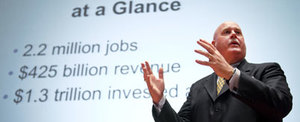Good executives fail, and learn, says CEO
Published: October 7, 2011 / Author: Ed Cohen

Terry Cavanaugh’s advice to business students filled most of the screen at the front of the auditorium.
It consisted of two words and a punctuation mark.
“Fail Harder!”
The CEO of Erie Insurance Group, a 1975 graduate of the University of Notre Dame, was addressing the Boardroom Insights class and lecture series Oct. 7, 2011, at Notre Dame’s Mendoza College of Business.
Erie Insurance, based in Erie, Pennsylvania, is a Fortune 500 company with 3.5 million customers in 11 states and annual revenues of $4.3 billion. Cavanaugh joined the company in 2008 after a 33-year career with the Chubb Group of Insurance Companies.
He told students it’s important to learn how to fail because failure is a great teacher.
“When I interview executives for positions I ask about what has been a point of failure in their careers,” he said. “And when I hear them say, ‘I’m perfect, I’ve only done wonderful things over my 15 or20 years,’ I check them off. They’re either delusional or they’re not stretching themselves far enough to be a good executive, a good leader.”
He gave two examples of positives coming from failure.
The first involved Steve Jobs, the co-founder and celebrated CEO of Apple Inc. who had died two days prior to Cavanaugh’s talk. Cavanaugh described how Jobs responded after being fired from Apple in 1985 when Jobs was 30.
“He could have easily just gone off to the wilderness with the money and decided not to do anything,” Cavanaugh said.
Instead Jobs recreated himself, changing his management style, vision and focus, Cavanaugh said. After returning to Apple in 1996 he led the company to even greater heights, “which I don’t think anybody anticipated.”
The other story involved Cavanaugh himself.
When he was a young executive with Chubb in the early 1990s, he said, he and a company agent had an idea for a new insurance product to protect individuals going through the often-expensive process of private adoption. Cavanaugh knew the situation well. He and his wife adopted four children and the agent had two adopted children himself.
Cavanaugh said Chubb spent “several hundred thousand dollars” to bring the adoption-insurance product to market. Over the course of the next six to eight months it sold a hundred policies.
“It was a complete failure financially, operationally,” he said.
Cavanaugh said his enthusiasm and emotional attachment to the idea had clouded his judgment of its market potential. The business plan counted on attorneys to promote the product, but many lawyers feared it would diminish their role in private adoption, he said. Also, the price turned out to be higher than many would-be adoptive parents thought they could afford, he said.
But his bosses understood. They only wanted to know what he’d learned from the experience and how he could apply those lessons to future opportunities, he said.
“What I took with me was an openness of leadership that said it’s good to fail, it allows you to learn, as long as you can take that learning and channel it into a more productive, positive experience the next time,” the CEO said. “Leaders are open to those opportunities and recognize that everything doesn’t fall into place perfectly every time.”
Held during fall semester, Boardroom Insights brings corporate leaders and senior executives to campus to discuss current business issues. The series can be taken as a course by undergraduate or graduate students. The lectures are open to the public.
/news_and_events/news_articles/article/10160/good-executives-fail-and-learn-says-ceo




